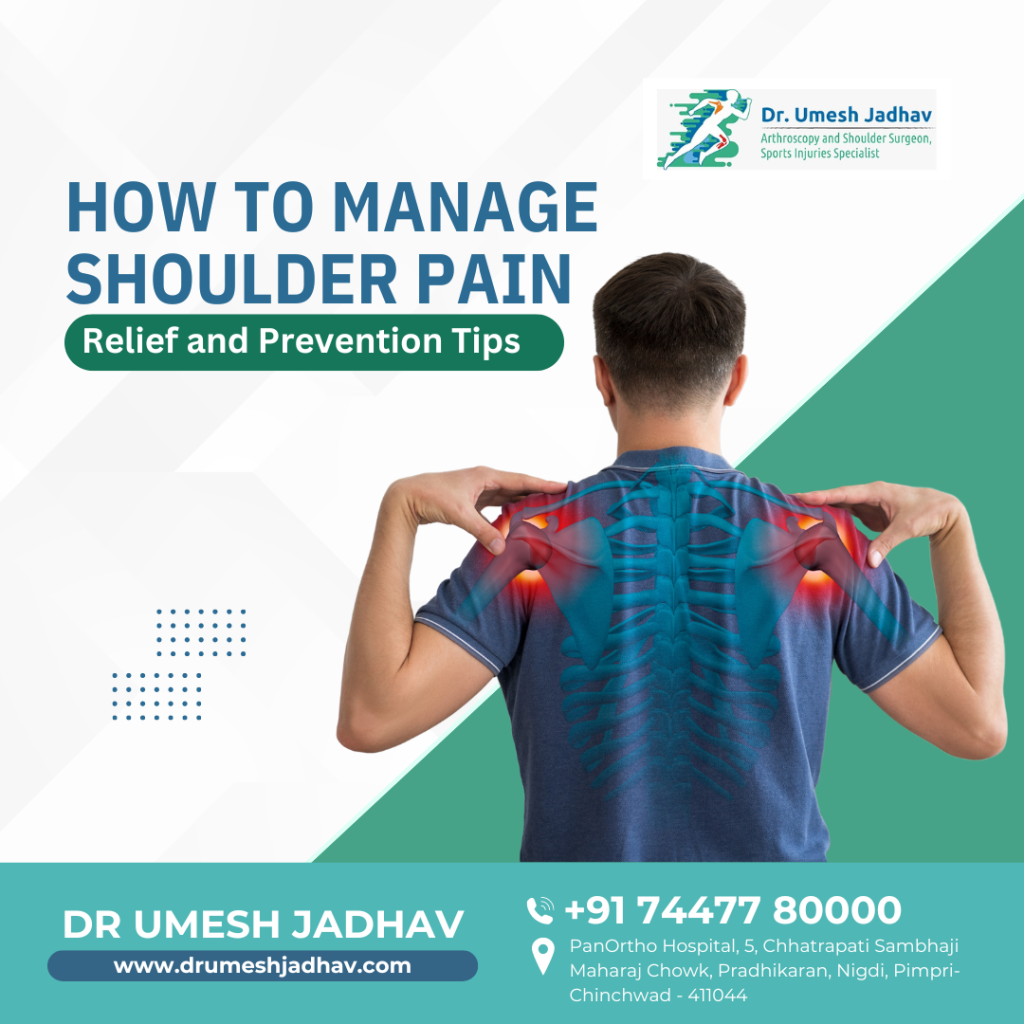Shoulder pain may be such a distraction, really bugging you and impairing your ability to live your life as you want. It can occur because of injury, bad posture, or overuse. The ability to manage and prevent shoulder pain is essential to living comfortably and as actively as possible. In this blog, we’ll explore effective solutions for managing shoulder pain, guided by one of the best orthopedic doctors in Nigdi, PCMC. Here’s a simple guide to help you find relief and keep your shoulders in great shape.
Common causes of shoulder pain include:
- Rotator Cuff Injuries: Tears or strains in the muscles and tendons around the shoulder.
- Tendonitis: Inflammation of the tendons from overuse or repetitive movements.
- Frozen Shoulder: Stiffness and pain in the shoulder joint with reduced mobility.
- Arthritis: Conditions like osteoarthritis or inflammatory arthritis affecting the shoulder joint.
- Shoulder Impingement: Compression of tendons and bursa in the shoulder, leading to pain and inflammation.
- Shoulder Bursitis: Inflammation of the bursa, a fluid-filled sac that cushions the shoulder joint.
- Dislocated Shoulder: The upper arm bone pops out of the shoulder socket due to trauma.
- Labral Tears: Tears in the cartilage that line the shoulder socket, often from injury or overuse.
- Poor Posture: Slouching or hunching can cause strain on your shoulders.
Simple Solutions for Shoulder Pain:
Now, let’s explore some straightforward yet effective solutions for managing shoulder pain:
1. Apply Ice or Heat
Ice: Use an ice pack that has been covered in a towel for 15 to 20 minutes a few times a day to help reduce swelling and numb the pain if it is recent or from an injury.
Heat: Use a warm towel or heating pad to relax the tight muscles and get more blood flowing into your body. Heats best for muscle aches or stiffness, not for swelling.
2. Do some Gentle Stretches
Common stretches that can prove useful in keeping stretchy and pain-free include the following:
Pendulum Stretch: Forward bend and let your arm hang down. Gently swing it in little circles.
Cross-Body Stretch: Cross one arm across your chest, allowing your other arm to apply a bit of pressure at the elbow to stretch your shoulder.
3. Increase Strength in Muscles around the Shoulder
To prevent such injuries in the future, increase the strength of muscles near your shoulders with these exercises:
Shoulder Press: Press your light weights overhead, then slowly return them to the starting position.
Rows: Pull the resistance band or weights toward your body while keeping your back straight.
4. Maintain Good Posture
Good posture can minimize shoulder stress:
Sit Up Straight: Sit up straight and ensure your shoulders are back as slouching stresses your shoulders extra.
Alter Your Workspace: Ensure your computer monitor is at eye level and utilize a chair that lends itself to good posture.
5. Avoid Repetitive Strain
Repetitive work or activities can cause shoulder pain:
Take a Break: Whenever doing repetitive tasks, take a break after some time to stretch and move about.
Use the Right Technique: When lifting or doing some activities, use appropriate techniques to avoid unnecessary strain.
6. Visit a Specialist
If the home remedies do not relieve your shoulder pain, then it makes sense to consult with a healthcare provider, who, after proper diagnosis, can advise on the use of, for instance, physical therapy, drugs, or even surgery, in more severe cases.
7. Lifestyle Changes Sometimes it’s just a matter of lifestyle changes. Keep a healthy weight, as excess strain weighs heavily upon the shoulders. Even simple exercise goes a long way toward keeping muscles strong and flexible.
One with shoulder pain must employ self-help techniques before getting orthopedic advice. Knowing the causes, appropriate utilization of treatments, and lifestyle changes can all help to address it effectively and prevent other problems from occurring. If you’re suffering from constant shoulder pain, then seeing advice from a medical professional is a good step toward recovery.
There is no reason shoulder pain should be complicated. Simple solutions such as rest, ice and heat therapy, gentle exercises, and posture correction can effectively manage shoulder pain to improve quality of life. Don’t let shoulder pain tie you down from becoming active again. Get a proper evaluation from an experienced healthcare professional like Dr. Umesh Jadhav, one of the best orthopedic doctors and shoulder specialists at Nigdi, PCMC. develop a personalized treatment plan for your requirements.
Take action today to start living pain-free!

